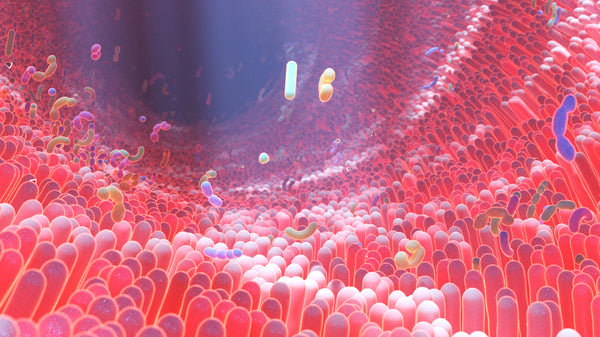
Syntol Enhanced Immune-Probiotic
Bacillus subtilis
Syntol’s dominant immune component is Bacillus subtilis or “B. subtilis”, a powerful spore probiotic that can withstand harsh intestinal conditions related to pH or temperature. Its ability to thrive in the intestinal environment improves the chances that these healthy bacteria will grow and maintain optimum levels of probiotics in the gut. B. subtilis on its own has shown a very strong ability to support healthy yeast levels [8]. Research consistently shows that probiotics promote healthy digestive function by binding to certain organisms (e.g., yeast) in the intestines and decreasing their access to the body through the bloodstream [9, 10]. Consequently B. subtilis can indirectly support the immune system by reducing its workload.
Another possible mechanism for the benefits of B. subtilis is improved gut barrier function. This appears to promote immune health by disrupting the circulation of harmful invaders. Consuming this type of probiotic encourages a strong response that primes the immune system.
Enzymes
Syntol AMD also contains an enzyme-based yeast cleanse formula that supports immune health. More specifically, the enzymes can break down the protective outer layer of yeast as well as their cellular components [5, 6]. Probiotics in the gut generally struggle to thoroughly remove dead cells without the assistance of additional enzymes. In the absence of these digestive enzymes, fermentation may develop and harmful byproducts from dead cells may leak into the bloodstream, thereby putting even more strain on the immune system. By flushing out this waste, the enzymes in Syntol AMD may reduce an otherwise uncomfortable detoxification process.
Another key ingredient in Syntol is a prebiotic fiber called Isomalto Oligosaccharide, which nourishes probiotics. Prebiotics are well-known for their ability to boost the growth of healthy bacteria [7]. Having both prebiotics and probiotics (pre+pro) in the same formula is referred to as a synbiotic. Synbiotics supplements are ideal for discouraging yeast, toxins, or harmful bacteria. This subsequently heightens immune health by opposing harmful invaders from circulation.
Conclusion

In summary, Syntol AMD provides B. subtilis, an exclusive immune-strengthening probiotic, prebiotics that ensure optimal probiotic function, and powerful enzymes that digest dead cells to reduce the risk of fermentation and toxic byproduct build up. These benefits equal superior immune support that regular probiotic products fail to offer. Taking Syntol AMD regularly is the key to maintaining an immune system that functions efficiently no matter what type of harmful stimuli the body encounters.
References
- Freedman K, et al. Examining the Gastrointestinal and Immunomodulatory Effects of the Novel Probiotic Bacillus subtilis DE111. Int J Mol Sci. 2021;22(5):2453.
- Lefevre M, et al. Probiotic strain Bacillus subtilis CU1 stimulates immune system of elderly during common infectious disease period: a randomized, double-blind placebo-controlled study. Immun Ageing. 2015;12:24.
- Paytuví-Gallart A, et al. Daily intake of probiotic strain Bacillus subtilis DE111 supports a healthy microbiome in children attending day-care. Benef Microbes. 2020;11(7):611-620.
- Townsend J, et al. Effects of Probiotic (Bacillus subtilis DE111) Supplementation on Immune Function, Hormonal Status, and Physical Performance in Division I Baseball Players. Sports. 2020;6(3):70.
- Isenman L, et al. The endocrine secretion of mammalian digestive enzymes by exocrine glands. Am J Physiol. 1999 Feb;276(2 Pt 1):E223-32.
- Kolac C, et al. Oral bioavailability of proteolytic enzymes. Eur. J. Pharm. Biopharm. 1996;42(4): 222-232.
- Roberfroid M, Gibson GR, Hoyles L, et al. Prebiotic effects: metabolic and health benefits. Br J Nutr. 2010;104(Suppl 2):S1-S63.
- Zhao, C., Lv, X., Fu, J., He, C., Hua, H. and Yan, Z. (2016), In vitro inhibitory activity of probiotic products against oral Candida species. J Appl Microbiol, 121: 254-262.
- Alvarez-Olmos MI, Oberhelman RA. Probiotic agents and infectious diseases: a modern perspective on a traditional therapy. Clin Infect Dis. Jun 1 2001;32(11):1567-1576.
- Kabak B, Brandon EF, Var I, Blokland M, Sips AJ. Effects of probiotic bacteria on the bioaccessibility of aflatoxin B(1) and ochratoxin A using an in vitro digestion model under fed conditions. J Environ Sci Health B. 2009; 44(5):472-80.